Amidst the lush, rolling hills of Mao, a little girl would hurry home from school, her footsteps quickening as the scent of fresh earth and wildflowers filled the air. Her parents, hardworking farmers, would be in the fields; she would eagerly lend a hand, carrying baskets of fruits and vegetables from the farm, her small hands carrying whatever little weight they could.
But it was in the quiet corners of the land, where a patch of flowers bloomed, that she found the most comfort. There, tending to her lot with the same care her parents had taught her, she would look at their delicate beauty, unaware that these moments spent nurturing those flowers would turn into a vision that would connect the hills of Mao to the cities far beyond.
Mao, in Manipur, often referred to as the “land of flowers”, is known for its lush, organic produce and its people’s love for nature. Chokhone Krichena, the 32-year-old founder of Dianthe Pvt. Ltd., is leveraging these sentiments to help floriculture farmers by bridging the gap between rural growers and urban consumers. By helping backend farmers get market access, she is giving them a means to safely grow their flowers and sell them at a fair price, driving the local economy.
From a hobby to a business
Chokhone’s journey into floriculture was not a sudden one, but rather a story of rediscovery. Growing up in a farming family, she was always surrounded by agriculture, even though her family’s land was not suitable for large-scale commercial farming. The hilly terrain of Mao makes it difficult for farmers to grow cash crops. Instead, most people cultivate fruits and vegetables using traditional, sometimes primitive methods. Despite this, there was always an air of possibility in the village — and for Chokhone, it was the flowers that caught her attention.
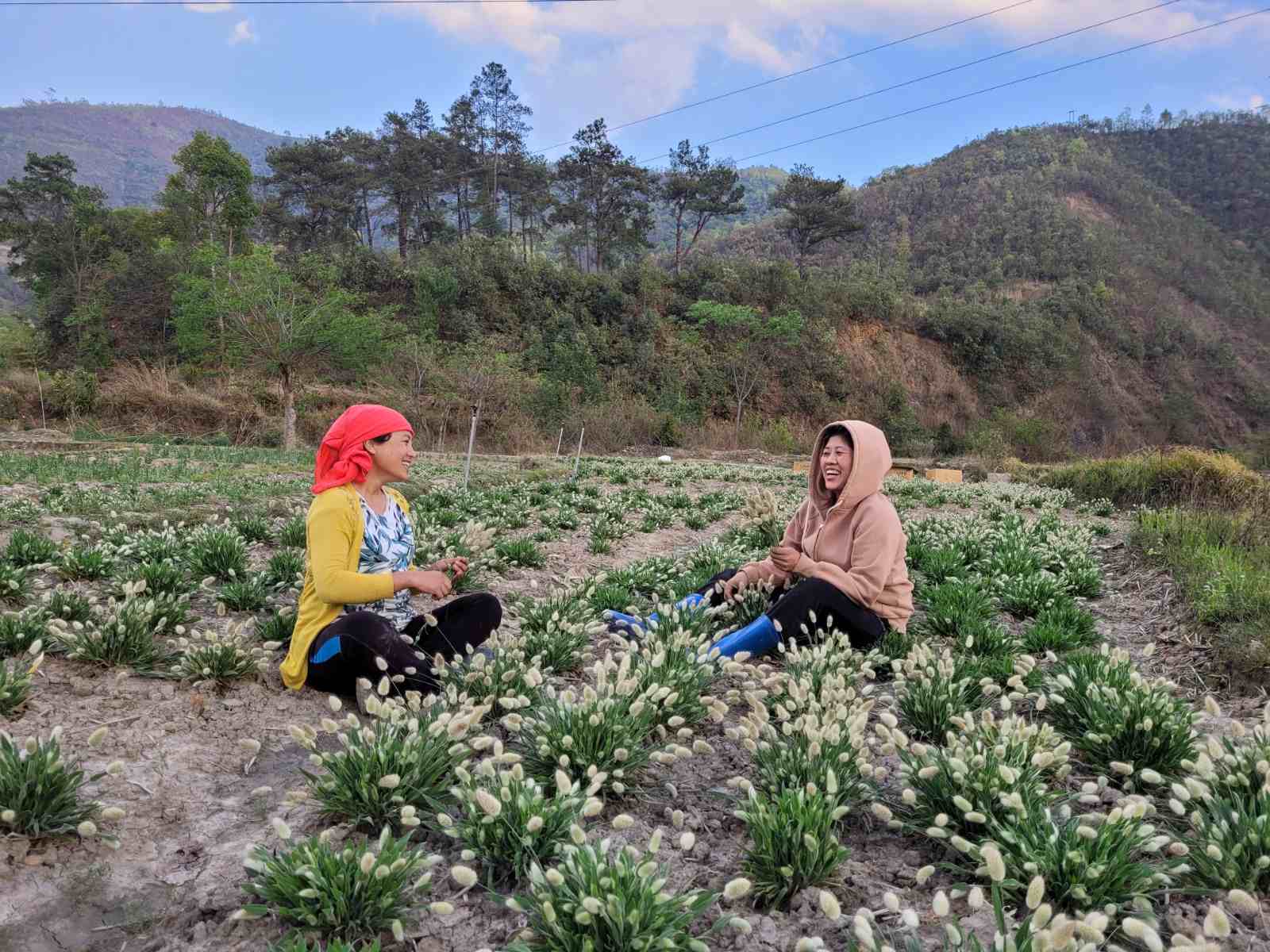
“I’ve always been very interested in flowers since I was a little girl. It was my hobby, but I never thought of monetising it until after COVID,” Chokhone tells The Better India. During the pandemic, like many others, she found herself reconnecting with old interests. As people across the world took up hobbies like gardening and pottery, Chokhone returned to her childhood passion: floriculture.
“I started growing flowers in a small patch of land near my house, and slowly, people started taking interest and placing small orders,” she says. It was in these early days that Dianthe began to take shape. “Since there was a little demand, and I knew how to connect with sellers, I thought, why not turn it into a business,” she shares.
When are you going back to the city?
The transition from hobbyist to entrepreneur wasn’t immediate. Chokhone’s family, especially her parents, were sceptical at first. After all, she had gone through the conventional educational route, getting a degree in Biotechnology from Guwahati, and interning at a pharmaceutical company in Bengaluru. In Mao, where job security and a stable career were prioritised, her decision to pursue floriculture was met with concern.
“When I told my parents about my plan to work with flowers, they weren’t very convinced. Even my neighbours questioned me, asking when I would go back to the city and get a ‘proper’ job,” Chokhone admits. But despite the odds, she stayed the course, even when the rest of her community remained sceptical.
As she worked with flowers, the idea of connecting small-scale farmers in Mao with urban markets began to take root. Farmers in the region were facing significant challenges, including limited market access and low returns on their produce. Flowers, however, presented a promising alternative.
The initial idea behind Dianthe was simple yet powerful: to create a market for local farmers’ flowers, help them generate better revenue, and connect them with consumers in larger cities.
In 2021, Chokhone took the leap and formally registered Dianthe. She began by distributing fifty flower saplings to interested farmers and offered them a buyback policy, guaranteeing to purchase the blooms at fair prices.
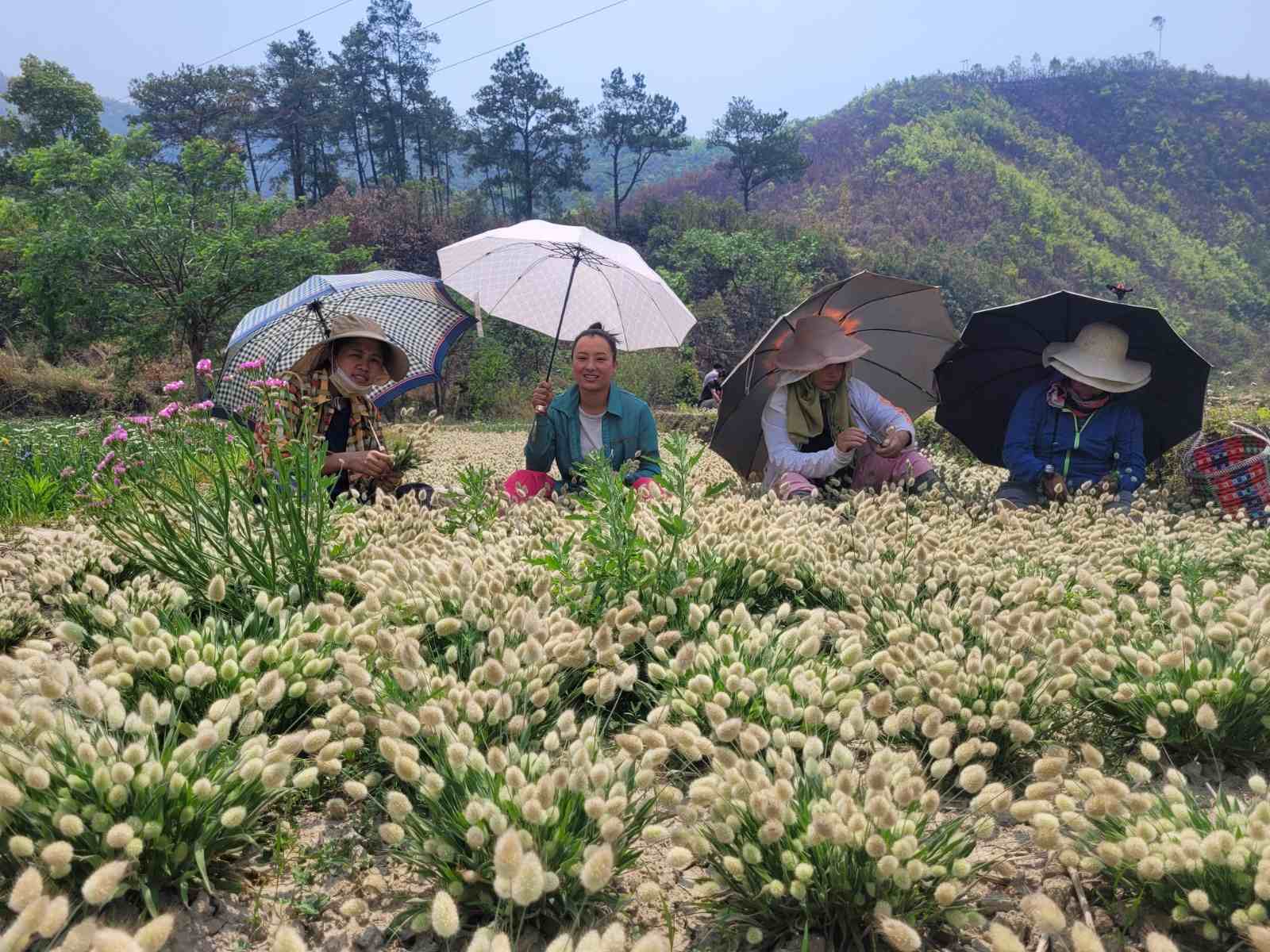
“At first, people were doubtful. They had always grown vegetables, and flowers seemed like an uncertain choice. But when they saw the flowers bloom, they realised they could sell them for three to four times the price of vegetables,” she shares.
Through Dianthe, Chokhone makes multiple products like candles, wedding gifting items, flower arrangements, bouquets, boutonnières, and epoxy flower presentations along with working with B2B brands. Chokhone and her team are always experimenting with different types of flowers to expand their range and cater to diverse market demands.
For instance, food colouring is commonly used for dyeing flowers, which is a standard industry practice. However, Dianthe is also exploring the use of natural dyes extracted from vegetables and fruits, although this option remains limited in scope.
A growing network of empowered farmers
Dianthe’s success has been rooted in its ability to provide a platform for farmers to connect with buyers, while also educating them on best practices for floriculture. “Many of the farmers here were working with limited land and struggling to make ends meet. But once they started growing flowers, they could earn multiple times more than they ever did with vegetables,” Chokhone explains.
Her efforts also include training farmers on how to properly care for flowers, ensuring that they meet market demands. “Flowers need to be harvested at the right time, and they must be handled delicately. We teach the farmers how to do that,” she adds. One of the most exciting aspects of Dianthe’s growth has been its ability to empower women in Mao.
Women have always been a significant part of the agricultural workforce, and many of them have embraced floriculture as a way to supplement their income. Chokhone’s work has created jobs and fostered a sense of self-worth and independence among the women of Mao.
One of the collaborators in Chokhone’s venture is Esther Chiswute, a 52-year-old farmer who has been growing flowers for decades. “I’ve been planting flowers for a long time, but I’ve only been selling them since 2005,” Esther shares. “My husband and I were always looking for better market access, and that’s when we came across Chokhone. Since we’re an older couple, we needed someone young to help us expand and learn more.”
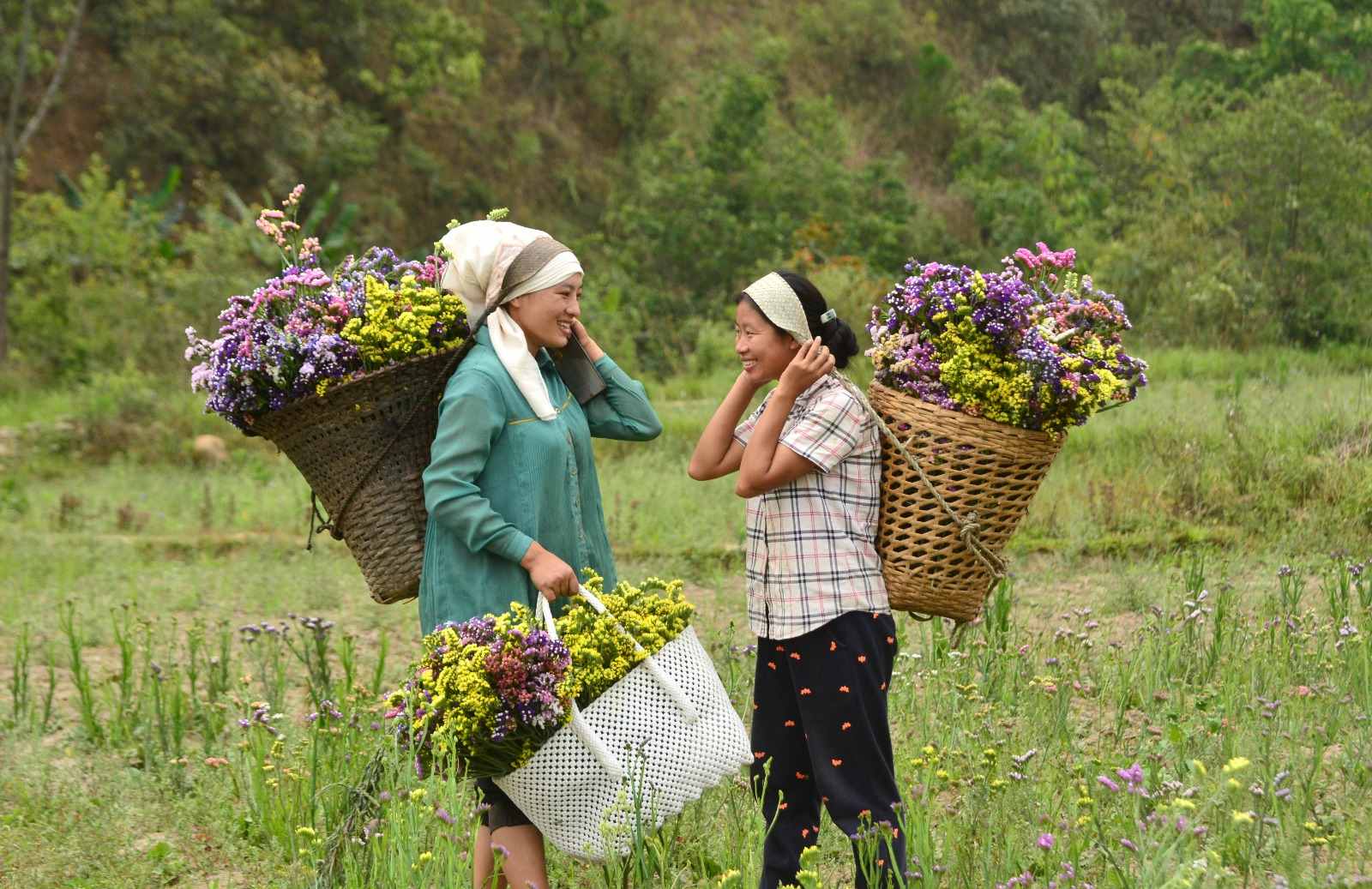
Esther and her husband had been growing flowers for personal use but lacked the marketing know-how to sell them in larger markets. Chokhone’s business acumen has been a game-changer for them. “She knows how to market the flowers, how to display them, and how to make them attractive to buyers. Thanks to her, we’ve sold our flowers in places we never thought we could,” Esther says.
Through Dianthe, Esther and her husband have been able to sell their flowers for better prices, expanding their business and reaching more customers. “Many times, people will grow these flowers and if they can’t find a place to sell them, they have to sell it at a price where they are essentially losing money,” Esther explains. “Either that or the produce rot and they are left with nothing. The risk was high, which is why less people would venture into floriculture,” she shares.
Flowers are mostly aesthetic and require specific care to make sure that they bloom at the right time and maintain their quality for market demand. Since last year, Chokhone has been providing training to farmers interested in these details. Some of these tips include using wiring and support systems to create specific shapes, ensuring that flowers meet the standards expected by urban buyers.
Moreover, despite operating in a relatively isolated region, Chokhone is working towards building market linkages, connecting with different artisans and sectors to increase awareness of their project and explore potential collaborations.
A beautiful albeit difficult terrain
Starting and running a floriculture business in a remote area like Mao is not without its challenges. Connectivity issues, lack of skilled labour, and limited resources have all made the journey difficult.
“Shipping flowers is a challenge. Sometimes they rot during transit, and the delivery services here don’t always take care of the products properly,” Chokhone says.
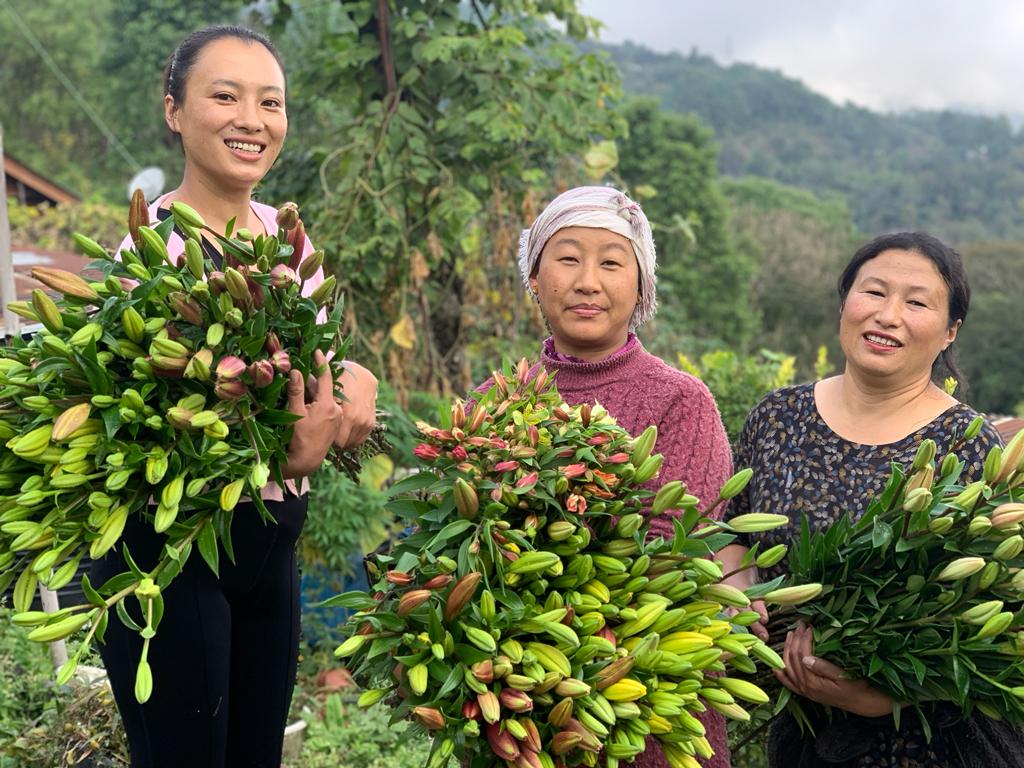
Additionally, Mao’s mountainous terrain means that water scarcity is a persistent problem for farmers. “Flowers need a lot of water, and it’s a constant struggle to make sure they get enough. But solving these issues requires policy-level intervention,” she acknowledges.
Despite these setbacks, Dianthe has grown steadily. The company has shifted its focus to dried flowers, which have a longer shelf life and can be more easily shipped across regions. “Dried flowers have become our primary focus because they have better export potential. They don’t spoil like fresh flowers, and we can market them much more easily,” she explains.
On average, they generate about Rs 80,000 per month, with an annual turnover of around Rs 12 lakh. The number of farmers engaged fluctuates, typically ranging from 50 to 60 per month, depending on demand. However, these figures are not fixed, as the volume of orders can vary. Despite the irregularities in demand, the business continues to grow and thrive, proving that there’s a steady market for high-quality dried flowers and floriculture products.
What is working with flowers like?
“Not all flowers are created equal when it comes to ease of care,” Chokhone shares. “Some are real stars, while others can be a bit of a headache. For instance, statice (or lemoniums) is one of my favourites. This flower is perfect for drying because it retains its colours for over a year! And it comes in a wide range of shades, like a whole palette of it. Then there are bunny tails, which are super easy to grow. No matter how healthy they are, they still bloom beautifully, and drying them is a breeze. Plus, they’re like a blank canvas for dying; you can dye them in almost any shade,” she says.
“On the other hand, there are some flowers that can really test your patience. Baby’s breath, for example, is notoriously difficult to grow. It’s so tricky that we have to resort to tissue culture just to get it going. People love it, and it’s in high demand, but it’s not the easiest flower to work with,” she explains.
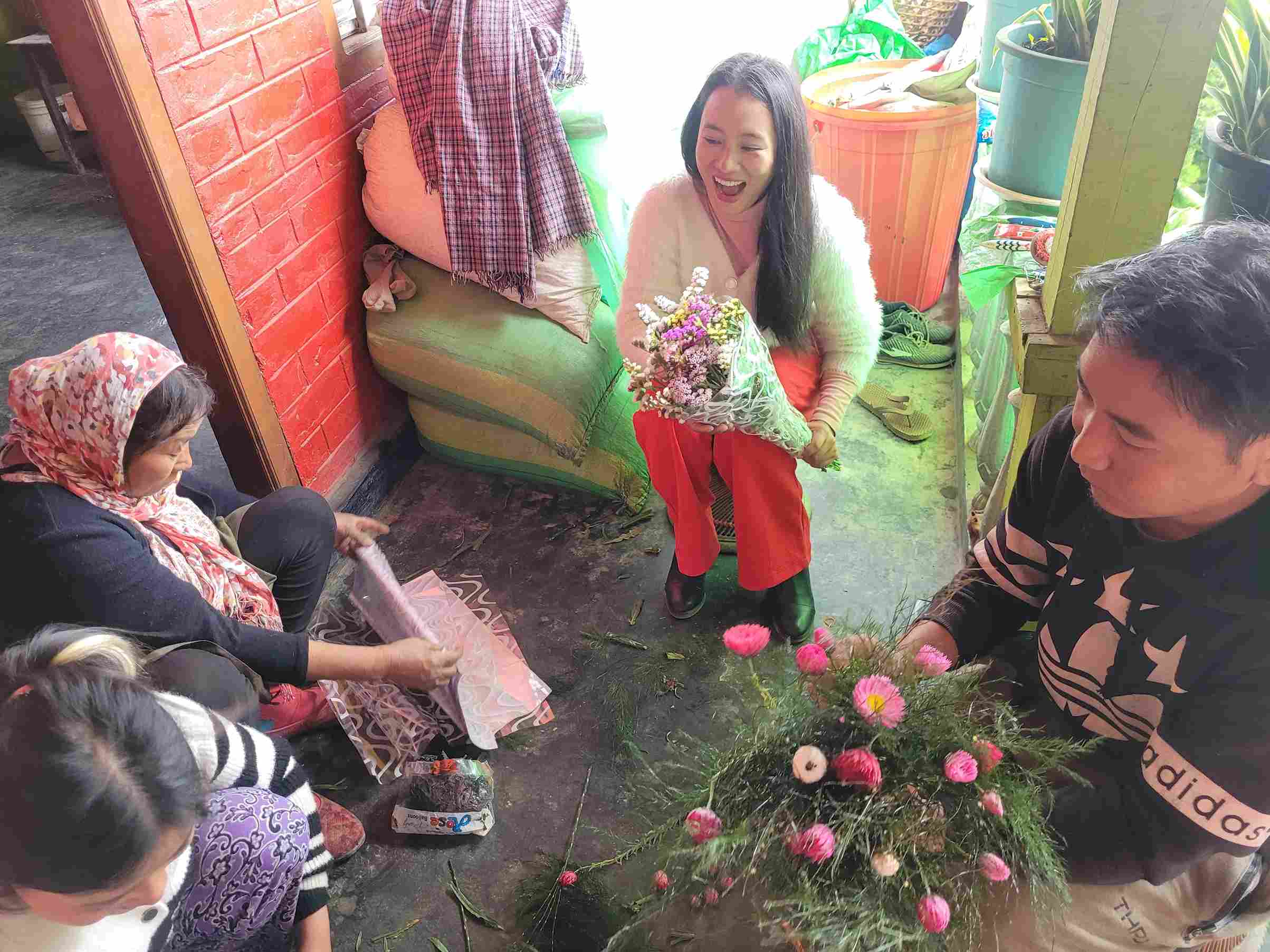
“I used to adore white carnations as well, but they just don’t dry well, so they’ve been phased out of our collection. Sometimes, flowers are like that stubborn friend who won’t cooperate, no matter how much you try,” she laughs.
A funny incident that stands out for Chokhone occurred around Valentine’s Day when a customer requested a dried black rose. At the time, she had no idea how to create one, but, like many other requests, she had to take on the challenge despite knowing that it might not look ideal. “It’s moments like these that reveal the pressures and quirks of working with flowers and customer expectations,” she shares.
Pats on the back
The impact of Dianthe has been far-reaching. Chokhone’s work has provided a significant income boost for farmers in the region, and many have expressed gratitude for the opportunity to be part of the floriculture revolution. In recognition of her efforts, Chokhone received a grant of Rs 3 lakh from RKVY-RAFTAAR, which has helped her scale her business. She was also selected to showcase her products at the Agri Conclave and Kisan Sammelan 2022 in Pusa, New Delhi.
Looking ahead, Chokhone plans to continue expanding Dianthe and its impact. “We need more funding for technological intervention to improve our drying processes and enhance the quality of our products,” she says. With the support of platforms like 200 Million Artisans, their Kula Conclave programme and Chokhone’s growing network of farmers, she is confident that Dianthe will continue to thrive and help more farmers in Mao earn a better living.
Edited by Arunava Banerjee; All images courtesy Chokhone Krichena
No comments:
Post a Comment